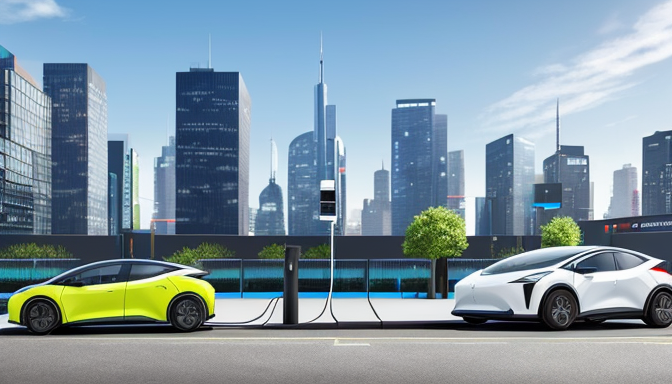Are you ready to dive into the future of transportation? Electric vehicles (EVs) are not just a trend; they’re a revolution that’s reshaping how we think about driving. Yet, despite their growing popularity, numerous misconceptions linger like stubborn shadows. Let’s shine a light on these myths to reveal the truth about EVs and their potential to transform our roads.
One of the biggest misconceptions is that electric vehicles are not environmentally friendly. Many people argue that the production of EV batteries and the electricity they use contribute significantly to pollution. However, when you compare the overall lifecycle emissions of EVs to those of traditional gasoline cars, the results are astonishing. For instance, studies show that EVs can produce up to 60% less CO2 over their lifetime, especially when charged with renewable energy sources. This means that the more we invest in clean energy, the greener our electric vehicles become!
Another common myth is that electric vehicles have a limited range, leaving drivers feeling like they’re on a tightrope. But with recent advancements in battery technology, modern EVs can travel over 300 miles on a single charge. That’s more than enough for most daily commutes and weekend getaways. As charging infrastructure continues to improve, the fear of running out of juice is quickly becoming a thing of the past.
So, are you ready to embrace the electric revolution? With their environmental benefits and expanding range, electric vehicles are not just a smart choice; they’re a necessary step towards a sustainable future. Let’s not let myths hold us back from a cleaner, greener tomorrow!
Myth 1: Electric Vehicles Are Not Environmentally Friendly
Many people still cling to the belief that electric vehicles (EVs) are not as green as they claim to be. This misconception often stems from the production processes of batteries and the electricity sources used to charge them. However, when you dig deeper, the reality paints a much different picture. In fact, EVs can significantly reduce greenhouse gas emissions compared to traditional gasoline-powered cars. For instance, a study found that, over their lifetime, EVs can emit up to 60% less CO2 than their internal combustion counterparts.
Moreover, the energy landscape is rapidly evolving. Many regions are shifting towards renewable energy sources such as solar, wind, and hydroelectric power. This means that the electricity powering EVs is becoming cleaner every day. To illustrate this point, consider the following table:
| Energy Source | CO2 Emissions (g/km) |
|---|---|
| Gasoline Vehicle | 180 |
| Coal-Powered EV | 150 |
| Natural Gas-Powered EV | 100 |
| Renewable-Powered EV | 20 |
As you can see, even the least eco-friendly electricity sources have a lower carbon footprint than traditional vehicles. So, why do some people still doubt the environmental benefits of EVs? It could be the fear of the unknown or simply misinformation. But the truth is, as we transition to cleaner energy, the environmental impact of electric vehicles will continue to improve, making them an essential part of a sustainable future. So, the next time someone tells you that EVs are not environmentally friendly, you can confidently debunk that myth!

Myth 2: Electric Vehicles Have Limited Range
Ah, the age-old myth that electric vehicles (EVs) are just glorified golf carts with a short leash! Many people still believe that EVs can’t take them far enough, but let’s set the record straight. In reality, the range of modern electric vehicles has significantly improved, thanks to advancements in battery technology and a rapidly expanding charging infrastructure. Imagine driving across the country without the constant worry of running out of juice—sounds liberating, right?
Today’s EVs can easily cover distances that would make their predecessors blush. For instance, many new models boast ranges exceeding 300 miles on a single charge, which is more than enough for most daily commutes and weekend getaways. To put this into perspective, let’s look at a comparison:
| Vehicle Type | Average Range |
|---|---|
| Traditional Gasoline Car | 300-400 miles |
| Modern Electric Vehicle | 250-370 miles |
Furthermore, the charging landscape is evolving faster than you can say “supercharger.” With the installation of more fast-charging stations, drivers can recharge their EVs in as little as 30 minutes at strategic locations. This means you can grab a coffee, stretch your legs, and be back on the road in no time. So, the next time someone tells you that electric vehicles have limited range, just smile and remind them that the future of transportation is not just bright; it’s electrifying!
Frequently Asked Questions
- Are electric vehicles really better for the environment?
Absolutely! While no vehicle is 100% eco-friendly, electric vehicles (EVs) produce zero tailpipe emissions and can be powered by renewable energy sources, making them significantly cleaner than traditional gas-powered cars.
- What about the range of electric vehicles?
Range anxiety is a common concern, but modern EVs have come a long way! With advancements in battery technology, many electric vehicles now offer ranges comparable to gas cars, often exceeding 250 miles on a single charge.
- How do I charge an electric vehicle?
Charging an EV is as easy as plugging in your phone! You can charge at home using a standard outlet or a dedicated EV charger, and there are also numerous public charging stations available for on-the-go charging.
- Are electric vehicles more expensive?
While the upfront cost of an EV may be higher, they often save you money in the long run due to lower fuel and maintenance costs. Plus, many governments offer incentives that can help offset the initial price!